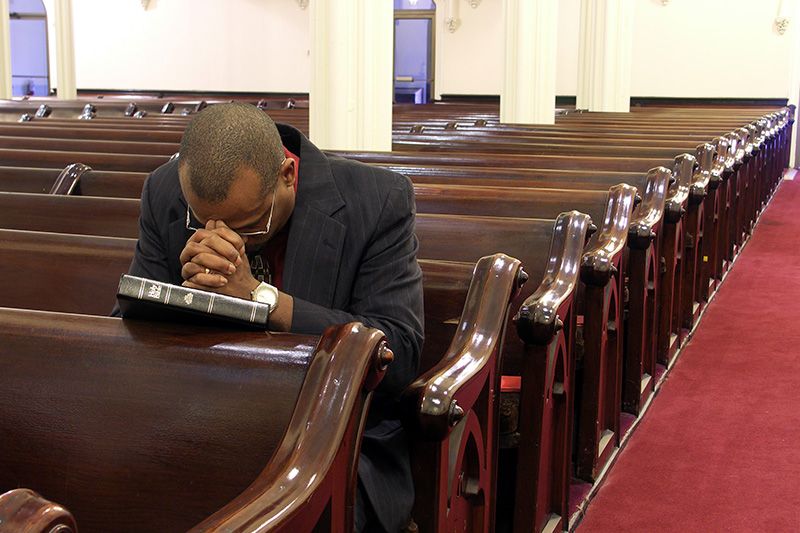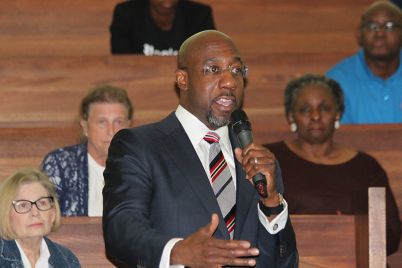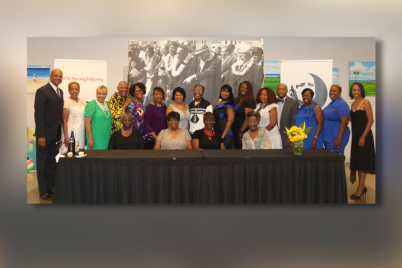Stigma directed at the gay community and an unwillingness to speak honestly about human sexuality within the Black church is costing Black lives.
By J.A. Jones, Staff Writer
ST. PETERSBURG – Equality Florida’s Executive Director Nadine Smith is direct when asked about the Black church’s role in stigma — around both HIV and human sexuality in general.
“Stigma directed at the gay community and an unwillingness to speak honestly about human sexuality within the Black church is costing Black lives,” Smith offered without hesitation.
Smith has spent her entire adult life fighting for justice, starting as far back as 1986, as a founding board of the International Gay and Lesbian Organization. She has been the executive director of Equality Florida (EF) since its inception in 1997 and served as executive director of the organization’s predecessor, the Human Rights Task Force of Florida.
She was one of four national co-chairs on the 1993 March on Washington and was among those who took part in the first-ever meeting between LGBT leaders and a sitting U.S. president – in this case, President Bill Clinton. She also served on the National Gay and Lesbian Task Force, the Human Rights Campaign, the National Center for Lesbian Rights, and the National Black Lesbian and Gay leadership Forum.
In the past, she shared her testimony on how stigma around her sexuality interrupted her relationship with her own father, a Baptist minister. While the rift between them had healed – evidenced by her father’s presence when she married her wife, Andrea, her experiences have given her deep awareness of the emotional harm anti-LGBTQ stigma, and behavior can cause.
And in discussing stigma within the Black church, Smith says unhealthy and repressive ideas about sexuality are at the root of the problem.
“There are people who point to slavery and speak to the legacy of rape and sexual violence, and the caricature of Black people as oversexed,” she added, alluding to familiar tropes like Mandingo or the caricature of the lascivious Black woman.
She said the desire to rebut these stereotypes has created an unwillingness to speak honestly about sexuality within the Black church. And, said Smith, the tendency to ignore or sublimate the stories of those we should be proud of due to how the church viewed them has meant not all of our stories are told – or are told incorrectly.
Smith pointed to Claudette Colvin, who was arrested nine months earlier than Rosa Parks but whose story was not promoted by the Black church, or the NAACP, for that matter. The reason? At 15, Colvin became pregnant not long after the incident and wasn’t considered an acceptable model of the movement as an unmarried, pregnant teenager.
The story of the Civil Rights Movement can’t be told, EF’s leader added, without remembering LGBTQ activists Bayard Rustin, James Baldwin, and Pauli Murray. While the importance of the Black church to the movement is irrefutable, the church’s struggle to accept those who chose same-gender-loving (SML) relationships meant the glossing over their achievements. “The Black church had ‘Don’t Ask Don’t Tell’ long before the military,” Smith asserted.
She noted that it’s impossible to speak about the progress of the Civil Rights Movement or the uplift of Black people in America without talking about the role of LGBT Black people. Nor can we discuss the Harlem Renaissance without discussing the overwhelming presence of Black LGBT innovators and pioneers.
And yet, said Smith, “What ends up happening is, in order not to address that history, it gets erased — and as Black people, we know what happens when you erase our roles, our presence in history. It’s intended to make us believe we didn’t exist or that our role was minor. “
Smith said the same thing occurs within the Black community when LGBT people get erased or their roles are removed and minimized. “It reinforces this idea that we don’t exist, or we exist in these very marginal ways. And if we are ostracized or ridiculed or stigmatized, it’s no big deal — when it is.”
Within the church itself, the prejudices against same-gender-loving people often start with the church leaders – and sometimes, within the church leadership, there exist pastors, deacons and deaconesses, choir leaders and their members, who are forced to hide and lie about their sexuality.
Smith referred to it as becoming “trapped by a prison of your own design,” noting that it’s not unusual for people who are the most homophobic and loudest to be people who are actually struggling with their own sexuality. This fear of being discovered, mused Smith, often leads closeted individuals to believe that “by becoming the first one to condemn gay people” they will be able to hide their own sexuality.
Equality Florida’s ongoing activism around protection of LGBTQ youth also works to fight against stigma, bullying, harassment, and social isolation. EF’s Safe and Healthy Schools Project works to create a “culture of inclusion” in Florida’s 67 school districts.
“We start with the premise that we all don’t want to see young people committing suicide, running away from home, self-medicating — that we want young people to thrive.” Smith said the peer-reviewed research behind The Family Acceptance Project notes that three places impact the trajectory of a young person: their home, their school, and if they have one, their faith community.
EF’s mission in the schools, relayed Smith, is to assure that while everyone — from students to teachers — may have different beliefs and different identities, “every one of those children deserves an environment where they can thrive. And we want to work with school districts to make that possible.”
She also feels that kind of partnership can be created with the Black church and noted that there has never been a time in EF’s history where the organization has not worked with pastors. While she acknowledged that the conversations had happened both as “allies or adversaries,” the point is that the conversations have been persistent.
Regarding the continuing work to be done with the Black church, Smith voiced cautious optimism.
“I think that where we are right now, while there’s not a complete ‘family reunion’ — there’s the beginnings. I think the atmosphere is conducive to coming together as a ‘family’ again.”
Smith pointed to the leadership of pastors such as Rev. J.C. Pritchett II, who are standing up to participate in the conversation, as proof that the church is evolving and open to talking about the issues.
For Smith, such discussions cannot come too soon. “Not only is it a conversation we can’t avoid — it’s a conversation we must have; we have an obligation to have.”
For more information on Equality Florida’s work visit, www.eqfl.org.









